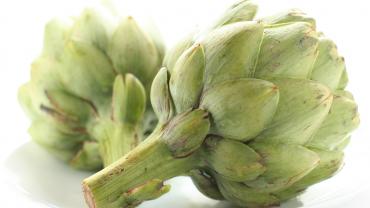
Artichokes (Cynara scolymus) have a long history of medicinal use, especially for the liver and for supporting digestive health. The traditional use of artichoke leaf extract has been substantiated through recent research demonstrating the health benefits of artichokes, including blood sugar metabolism, cholesterol metabolism, and liver health. The exact mechanisms for many of these properties remain under investigation, and many benefits may likely stem from the phytochemicals found in artichokes, including phenolic compounds and flavonoids, and prebiotic fiber, such as inulin.
Artichokes promote bile secretion and excretion, which aid in fat digestion and fat-soluble vitamin digestion. Artichokes also help remove toxins, cholesterol, xenobiotics, and other metabolites. These combined functions provide liver support and protection, and they promote normal body mass index, further reducing the risk of complications of obesity to the liver and other health aspects.
Artichokes can potentially protect the liver from damage and may help to improve liver status in those individuals who already have liver damage. In a systematic review and meta-analysis of eight studies, researchers summarized the effects of artichoke supplementation on the concentration of the liver enzymes of alanine transaminase (ALT) and aspartate aminotransferase (AST) in patients with nonalcoholic fatty liver disease (NAFLD) and other metabolic conditions. Serum ALT and AST levels are commonly used biomarkers to assess liver function and are considered indicators of NAFLD and metabolic syndrome.
The servings of artichoke leaf extract used in the studies ranged from 100 mg/day to 2,700 mg/day with duration ranges between 4 and 12 weeks. With the exception of one randomized, controlled trial that used metformin as the placebo, the other seven studies showed artichoke leaf extract elicited significant positive effects on liver enzyme levels compared to the placebo. Artichoke significantly reduced AST concentrations in those with NAFLD and significantly reduced ALT levels in overweight/obese patients or NAFLD.
Another randomized clinical trial published in Phytotherapy Research analyzed the effects of co-administration of artichoke leaf extract supplementation (ALES) with metformin and vitamin E in subjects with NAFLD. Patients were randomly divided into either a metformin-vitamin E group, a metformin-ALES group, or a vitamin E-ALES group. After 12 weeks, ALT and AST were significantly reduced within all study groups and the rate of liver fat accumulation was also significantly reduced within all study groups. Although larger clinical trials are needed, these results suggest that concomitant administration of artichoke leaf extract, vitamin E, and metformin may help ameliorate NAFLD complications.
Although the exact mechanisms are not fully elucidated, researchers believe the lipid and blood sugar-supportive actions of artichokes and their antioxidant and anti-inflammatory properties may explain the ability to favorably affect liver enzyme levels and impart hepatoprotective effects. Along with diet and lifestyle changes, supportive herbs, such as artichoke extract, may help promote normal body weight and support liver health, along with improving other risk factors for metabolic and cardiovascular diseases. Maintaining a healthy liver also aids in supporting the capacity of the body to detoxify environmental toxins, metabolic waste, heavy metals, and other xenobiotics.
By Caitlin Higgins, MSCN, CNS